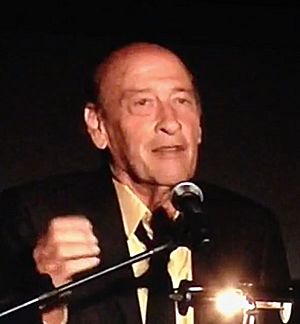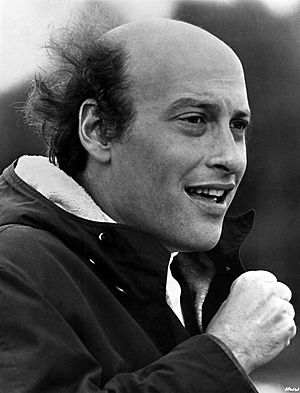Richard Lester facts for kids
Quick facts for kids
Richard Lester
|
|
|---|---|

Lester in 2014
|
|
| Born |
Richard Lester Liebman
January 19, 1932 Philadelphia, Pennsylvania, U.S.
|
| Other names | Dick Lester |
| Education | University of Pennsylvania (BA) |
| Occupation | Film director |
| Years active | 1959–2006 |
| Known for |
|
| Spouse(s) |
Deirdre Smith
(m. 1956) |
| Children | 1 |
Richard Lester Liebman (born January 19, 1932) is an American film director. He spent most of his career in the United Kingdom. He is famous for his fast-paced and exciting style in comedy films. His most well-known works include the Beatles' movies A Hard Day's Night (1964) and Help! (1965).
Lester started his career directing television in Philadelphia. He moved to the United Kingdom in the mid-1950s. There, he worked with famous comedians like Peter Sellers and Spike Milligan. After directing the Beatles' films, he made many other movies. These include the superhero films Superman II (1980) and Superman III (1983). He also directed A Funny Thing Happened on the Way to the Forum (1966) and The Three Musketeers (1973).
Richard Lester has been nominated for a BAFTA Award twice. He is also an honorary member of the London Film School. The British Film Institute says he perfectly captured the spirit of Britain in the 1960s. His unique humor and film style showed the energy of that time.
Contents
Early Life and Career Beginnings
Richard Lester Liebman was born on January 19, 1932, in Philadelphia. He was a very smart child. He finished high school early and started college at the University of Pennsylvania when he was just 15. He earned a degree in psychology in 1951.
Starting in American Television
Lester began working in television in 1950. He quickly learned many jobs, from stagehand to director, in less than a year. This was because not many people knew how to do these jobs back then.
He was the music director for Action in the Afternoon. This was a live American western TV show. It aired from 1953 to 1954 from Philadelphia.
Moving to British Television
In May 1955, Lester moved to London. He started directing TV shows there. He worked on detective series like Mark Saber.
He also wrote for shows like Curtains for Harry (1955). A comedy show he produced caught the eye of Peter Sellers. Sellers asked Lester to help bring The Goon Show to television. This became The Idiot Weekly, Price 2d (1956), which was very popular. Two more successful shows followed: A Show Called Fred (1956) and Son of Fred (1956).
Lester remembered that A Show Called Fred was broadcast live. This made him want to direct films, where he could do a scene more than once!
First Films and Success
Lester gained attention with The Running Jumping & Standing Still Film (1959). This was a short film he made with Spike Milligan and Peter Sellers.
His first full-length movie as a director was It's Trad, Dad! (1962). It was a musical with a small budget. His next film was The Mouse on the Moon (1963). This was a comedy produced by Walter Shenson.
Working with The Beatles
The Running Jumping & Standing Still Film was a favorite of the Beatles, especially John Lennon. When the band needed to make a movie, they chose Lester to direct.
A Hard Day's Night (1964) showed a fun, exaggerated version of the Beatles. It was a great way to promote the band. Many of its new filming styles are seen as the start of modern music videos. Lester even received an award from MTV as the "Father of the Music Video."
A Hard Day's Night was a huge hit with both critics and audiences. Lester then directed The Knack... and How to Get It (1965). This comedy won an award at the Cannes Film Festival.
Lester followed this with the second Beatles film, Help! (1965). This movie made fun of popular spy thrillers like James Bond. It was another big success. After this, Lester was asked to direct A Funny Thing Happened on the Way to the Forum (1966) in Hollywood.
He then made How I Won the War (1967). This was a dark, funny anti-war movie starring John Lennon. Lester wanted to show war as something completely against humanity. Even though it was set in World War II, the film hinted at the Vietnam War.
He also directed Petulia (1968) and the funny, post-apocalyptic film The Bed Sitting Room (1969). These films did not do well at the box office. Lester found it hard to get money for new projects for a while.
Adventure and Swashbuckler Films
Lester's career got a boost when he was hired to direct The Three Musketeers (1973). The producers decided to split the movie into two parts. The second part was called The Four Musketeers (1974). Both films were very successful.
He also directed Juggernaut (1974), a thriller set on a cruise ship. The success of the Musketeers films helped Lester get funding for Royal Flash (1975). He then made Robin and Marian (1976), starring Sean Connery and Audrey Hepburn. He also directed The Ritz (1976).
Lester also directed Butch and Sundance: The Early Days (1979) and Cuba (1979). Neither of these films made a lot of money.
Directing Superman Films
Lester's next film, Superman II, was a huge hit. Production for Superman II started before the first Superman movie was finished. The original director, Richard Donner, filmed most of Superman II. However, Lester was brought in to finish the last part of the movie. Much of Donner's original footage was changed or re-shot by Lester.
Gene Hackman, who played Lex Luthor, did not return for the re-shoots. So, Lester used a body double and a voice actor for Luthor's new scenes. In 2006, a version called Superman II: The Richard Donner Cut was released. This version mostly used Donner's original footage.
Richard Lester directed Superman III (1983). This third movie was not as popular as the first two. However, it still made a good amount of money at the box office.
Later Films and Retirement
In 1984, Lester directed the comedy Finders Keepers. The film received good reviews. One reviewer called it "wonderfully wacky."
In 1988, he brought back most of the Three Musketeers cast for The Return of the Musketeers. During filming in Spain, actor Roy Kinnear, a close friend of Lester, sadly died after falling from a horse. Lester finished the film, but then he retired from directing.
He returned only once more to direct Paul McCartney's concert film Get Back (1991).
In 1993, he presented a TV series for the BBC called Hollywood U.K.. It was about British movies from the 1960s.
Director Steven Soderbergh has praised Lester's work. Soderbergh wrote a book in 1999 called Getting Away with It, which includes interviews with Lester.
In 2012, the British Film Institute gave Lester a special award called a Fellowship. This is the highest honor in the British film industry. The award recognized his unique work and how his humor and style enriched the lives of many people.
Personal Life
In Steven Soderbergh's book, Lester shared that he is an atheist. He discussed his views with Soderbergh in the book. While at the University of Pennsylvania, Lester was part of the Sigma Nu fraternity.
Filmography
- The Running Jumping & Standing Still Film (1959) (short)
- It's Trad, Dad! (1962)
- The Mouse on the Moon (1963)
- A Hard Day's Night (1964)
- The Knack ...and How to Get It (1965)
- Help! (1965)
- A Funny Thing Happened on the Way to the Forum (1966)
- How I Won the War (also producer, 1967)
- Petulia (1968)
- The Bed Sitting Room (also producer, 1969)
- The Three Musketeers (1973)
- Juggernaut (1974)
- The Four Musketeers (1974)
- Royal Flash (1975)
- Robin and Marian (1976)
- The Ritz (1976)
- Superman (producer uncredited, 1978)
- Butch and Sundance: The Early Days (1979)
- Cuba (1979)
- Superman II (1980)
- Superman III (1983)
- Finders Keepers (1984)
- The Return of the Musketeers (1989)
- Get Back (1991)
- Superman II: The Richard Donner Cut (director uncredited, re-edited director's cut of Superman II, 2006)
See also
 In Spanish: Richard Lester para niños
In Spanish: Richard Lester para niños
 | DeHart Hubbard |
 | Wilma Rudolph |
 | Jesse Owens |
 | Jackie Joyner-Kersee |
 | Major Taylor |


